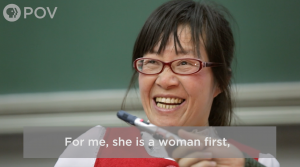Six Weeks: Filmmaker Interview
POV: Describe the film in your own words.

Six Weeks filmmaker, Marcin Janos Krawczyk
Krawczyk: The film presents the most important six weeks in the life of a newborn baby who is not conscious of its fate but can feel what is happening around…
POV: How did you become a filmmaker?
Krawczyk: I had an inner need ‘to repair the world.’ Each issue I want to explore in my films is linked with my personal experience and I feel I should tell it. I hope my movies can help someone, help the protagonists, the audience… or myself.
POV: Tell us about your interest in documentaries and short films.
Krawczyk: The most interesting thing in making documentaries is the possibility of showing the truth about the protagonists. I like to participate in their life problems, joys and sorrows. The short form makes me go to the essence of the problem from the very beginning. It demands constant precision in the construction of the emotional line.
POV: You also show many stages of what must have been a gut-wrenching process, how long did the entire process take to film? Was the editing process difficult?
Krawczyk: The most painful [stage] was my first meeting with the newborn babies left in the hospital room for orphans. It happened four years before I finished editing the movie. So, it took me four years to make this movie. First, it was a shock. Then, I tried to learn more about the problem and to process it. At first, I went to see the babies without the camera. I was just observing them. It was a very hard experience looking for a protagonist who would agree to be filmed and would be able to transmit the idea. The editing took a lot of time, despite the fact that we had only eight hours of footage (Thanks to the work of my great cinematographer, Wojtek Staron). I had to find a proper balance of emotional strength so as to be able to show the tension between mother, child and parents. At the same time I didn’t want to give any direct answer on what would be the best for the child in such a situation. It was also important for me to show a biological mother in a positive light at the moment of making such a difficult decision.
POV: How common is adoption in Poland and how has the film been received there?
Krawczyk: In my opinion, the crucial problem is the fact that women (who for many reasons cannot bring up their children) rarely decide to give them up for adoption after six weeks. That’s why the majority of the abandoned children go to orphanages. They are deprived of the love of people who would be willing to share their life with them. The film was very well received in Poland, especially by adoption specialists. I’m very happy about it because it was very difficult to make them trust me. The film will soon be screened in the Euro-Parliament as the only Polish documentary. I hope it will provoke discussion and will draw the attention of politicians to the problem of adoption.
POV: The birth mother in the film seemed to be grappling with a painful decision compounded by difficulties in her personal life. How is she doing now?
Krawczyk: The biological mother has to keep on living, being aware of what happened. I maintain contact with her. I try to support her in her everyday problems. The issue of her abandoned baby is still very fragile so we do not talk about it. Maybe this story will be continued in 18 years. Maybe she will meet her child when he or she is an adult person.
 Six Weeks: Filmmaker Interview
Six Weeks: Filmmaker Interview  The Apology: Filmmaker Statement
The Apology: Filmmaker Statement  Still Tomorrow: Film Update
Still Tomorrow: Film Update  Featured Event: 'QUEST' film screening with Company One and ZUMIX
Featured Event: 'QUEST' film screening with Company One and ZUMIX